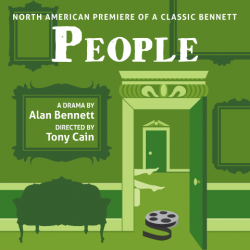People
By Alan Bennett
Directed by Tony Cain
Langham Court Theatre
Plays through January 31
Reviewed by Joy Fisher
British playwright Alan Bennett once described his play People as a “play for England.” How right he was! Which is why it was perhaps an unfortunate choice for a Canadian theatre.
The theme-the commodification of history-is universal enough in these neoliberal times when everything, as a character points out, “has a price, and if it doesn’t, it doesn’t have a value.” But Bennett’s satirical wit is focused specifically on the particular mission of England’s National Trust to restore and maintain heritage houses; so, for a foreigner like a Canadian (or, in the interests of full disclosure, in my case, an American) it’s a little hard to understand what all the indignation is about. Restoring heritage houses? What’s there to complain about in that?
There is not just a cultural disconnect; but also a class mismatch between this play and most members of its audience. The lead character, Lady Dorothy Stacpoole, played by Elizabeth Whitmarsh, is an aging member of the peerage. She lives, stoically, with her half-sister companion, Iris, (played by Geli Bartlett) in a mouldering country mansion that she can no longer afford to maintain. Dorothy stubbornly resists the entreaties of her other sister, June Stacpoole (played by Jan Streader), to turn the house over to the National Trust so that it can assume its rightful place as a piece of English history.
“This is not Allegory House,” Dorothy proclaims haughtily, refusing to see it as a metaphor for England. Voicing what one must take to be the playwright’s own view, Dorothy declares: “Gone should gone be, and not fetched back.” One suspects, however, that, in some vain manifestation of misplaced pride, she would rather see the house gone than tracked through by vulgar plebeians on a Sunday outing.
So horrified is Dorothy at the prospect of commoners on tour invading her private quarters that she grasps at other straws of salvation. One is an offer by a shady character representing a shadowy consortium seeking properties for undisclosed purposes. Another is an offer from an old friend from her youth (played by Toshik Bukowiecki) to rent the home as a location for a porno movie. Dorothy accepts the latter offer, and the play slips from satire into farce. The farce, it must be said, is much funnier than the satire. (The sex scenes in the four-poster bed are tastefully obscured from view by light reflectors held by members of the “film crew.”)
Porno films, however, are not a permanent solution to the cash flow problem, and, in the end, the National Trust has its way with the house. A scene showing its transformation from dilapidated ruin to fully-restored mansion was, I’m sure, meant to be satirical, judging by the robot-like march of the army of restorers-but it backfired. Clever lighting changes removed the dinge wall-by-wall and colorful pictures, too many to count, all painted by the unbelievably industrious set designer, Anne Swannell, completed the transformation. I think the playwright intended that I should despise the result, but I was enchanted.
Even Dorothy comes around in the end, agreeing to be a volunteer guide and throwing herself into her new role with all the gusto that only a stalwart member of the peerage could muster. To the aristocracy, I’m sure there was something of the tragic in the ending. But, commoner that I am, I couldn’t wait to buy my ticket for the house tour!
Joy Fisher is a Victoria playwright.

{ 0 comments… add one now }